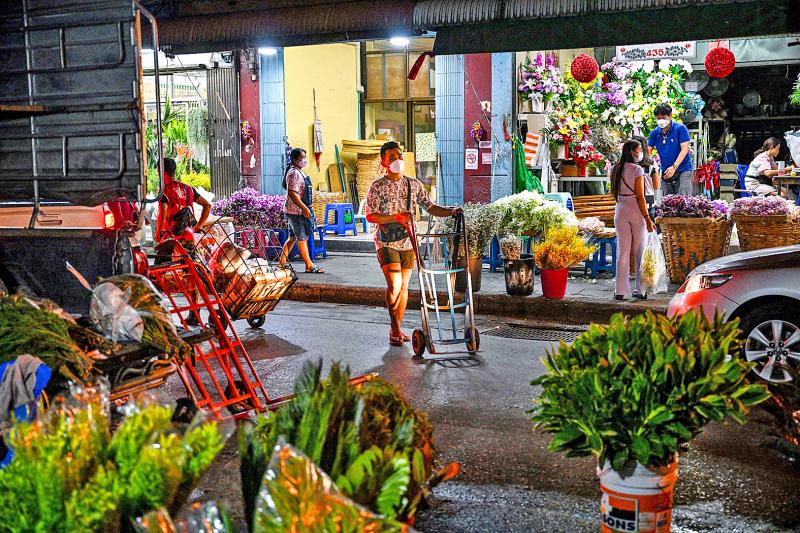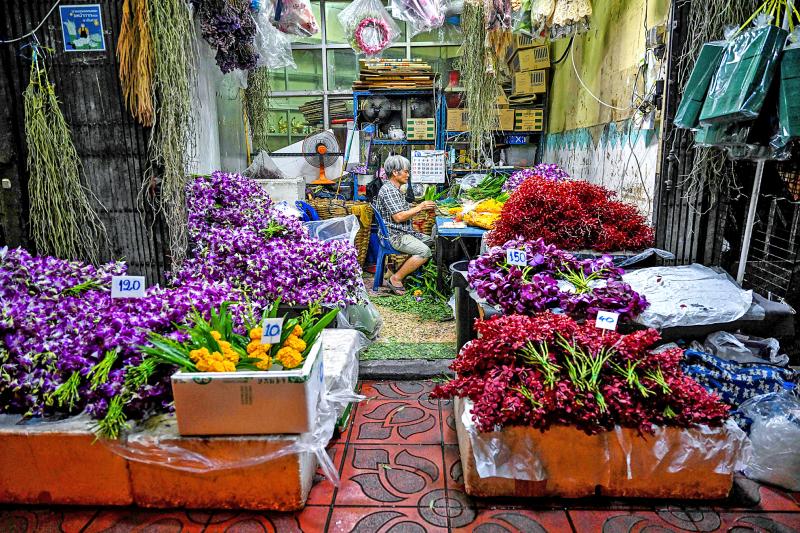Thailand’s orchid growers, already weary after two years of being battered by the COVID-19 pandemic, are bracing for fresh blows to their livelihood as the war in Ukraine and changing weather patterns further cloud their futures.
Once considered a popular pastime among the elite in Thailand, orchid growing has developed into a multimillion dollar industry, and the kingdom is the world’s biggest producer and exporter of cut orchids.
However, one in five farms have closed due to the pandemic, the Thai Orchid Exporter Association said.

Photo: AFP
“No one has the heart to buy flowers, and transportation is very complicated,” said Somchai Lerdrungwitayachai as he stares in despair at the sea of purple at his orchid farm west of Bangkok.
He grows Dendrobium Sonia orchids — a hybrid variety with delicate white and purple petals. Popular in Japan, China and the US, they are used for anything from religious ceremonies to college graduations.
At his 20-hectare property, workers treat the cut flowers with a special solution before trimming the stems and fitting them with a small vial, containing vitamins and nutrients, to preserve their fresh appearance for up to two weeks.

Photo: AFP
Times are tough: Somchai has been dipping into his savings for two years to keep paying his 50-odd employees.
COVID-19 and Russia’s invasion of Ukraine have sent the price of fertilizer and pesticides up by 30 percent, he said.
Adding to his woes are dramatically falling sales: pre-pandemic China bought 270 million orchid stems annually from Thailand — a figure that dropped to 170 million last year.
Once accounting for 80 percent of Somchai’s export income, China has been hit with COVID-19 lockdowns in a number of cities, including its biggest: Shanghai.
Transporting orchids to the key market by road used to take up to three days, but the same journey can now take between eight and 10 days.
In the flower business, time is money, and wilted orchids are frequently discarded before they can ever reach a Shanghai customer’s home to be admired.
While Somchai delivers his produce directly overseas, the majority of orchid growers in Thailand use large exporters based in Bangkok.
Air-freight costs have tripled or quadrupled in the past few months, depending on the destination, said Wuthichai Pipatmanomai, vice president of the Thai Orchid Exporter Association and co-owner of Sun International Flower, a major exporter.
Before the pandemic, the company was delivering 3.6 million orchids a month to China, Japan, Vietnam and the US.
Now, only 1.2 million flowers leave the warehouse, and he has had to let go of half of his staff.
“We have asked the authorities for financial support, but we have not received anything,” Wuthichai said. “Time is running out.”
Increasing his selling price by 20 percent has resulted in several importers — particularly those in Europe — dropping him to concentrate on more local flowers.
The only hope is that sales to Japan remain stable and those to the US increase with the start of the wedding season, he said.
In the long term, changing weather patterns are also troubling for growers.
“We are increasingly experiencing the effects of climate change,” Wutachai said, pointing to a recent surprise cold snap at the start of last month in which the temperature dropped sharply from 36°C to 21°C in just 24 hours, affecting orchid production.
“We are worried that these situations will occur more and more frequently,” he said.
Thailand’s COVID-19 restrictions have also affected domestic sales — a lack of tourists meant restaurants and hotels scaled back orders, and bans on gatherings affected Thai Buddhist ceremonies.
Despite the kingdom’s international reopening, local demand remains lukewarm.
While Bangkok’s biggest flower market appears busy — wholesalers can be seen scurrying through colorful aisles laden with large woven baskets containing flowers — vendors tell a different story.
Than Tha Win, waiting patiently at her orchid stall for customers, said her income is down 70 percent.
“Everyone is still afraid to come to the market because of COVID-19,” the 21-year-old said.
Meanwhile, 45-year-old vendor Waew said she has about 600 unsold orchids left over daily and tries to stem her losses by plucking off the petals and selling them as a separate product.
“Stop working with orchids? Impossible, I don’t know how to do anything else,” she said.

James Watson — the Nobel laureate co-credited with the pivotal discovery of DNA’s double-helix structure, but whose career was later tainted by his repeated racist remarks — has died, his former lab said on Friday. He was 97. The eminent biologist died on Thursday in hospice care on Long Island in New York, announced the Cold Spring Harbor Laboratory, where he was based for much of his career. Watson became among the 20th century’s most storied scientists for his 1953 breakthrough discovery of the double helix with researcher partner Francis Crick. Along with Crick and Maurice Wilkins, he shared the

OUTRAGE: The former strongman was accused of corruption and responsibility for the killings of hundreds of thousands of political opponents during his time in office Indonesia yesterday awarded the title of national hero to late president Suharto, provoking outrage from rights groups who said the move was an attempt to whitewash decades of human rights abuses and corruption that took place during his 32 years in power. Suharto was a US ally during the Cold War who presided over decades of authoritarian rule, during which up to 1 million political opponents were killed, until he was toppled by protests in 1998. He was one of 10 people recognized by Indonesian President Prabowo Subianto in a televised ceremony held at the presidential palace in Jakarta to mark National

US President Donald Trump handed Hungarian Prime Minister Viktor Orban a one-year exemption from sanctions for buying Russian oil and gas after the close right-wing allies held a chummy White House meeting on Friday. Trump slapped sanctions on Moscow’s two largest oil companies last month after losing patience with Russian President Vladimir Putin over his refusal to end the nearly four-year-old invasion of Ukraine. However, while Trump has pushed other European countries to stop buying oil that he says funds Moscow’s war machine, Orban used his first trip to the White House since Trump’s return to power to push for

LANDMARK: After first meeting Trump in Riyadh in May, al-Sharaa’s visit to the White House today would be the first by a Syrian leader since the country’s independence Syrian President Ahmed al-Sharaa arrived in the US on Saturday for a landmark official visit, his country’s state news agency SANA reported, a day after Washington removed him from a terrorism blacklist. Sharaa, whose rebel forces ousted long-time former Syrian president Bashar al-Assad late last year, is due to meet US President Donald Trump at the White House today. It is the first such visit by a Syrian president since the country’s independence in 1946, according to analysts. The interim leader met Trump for the first time in Riyadh during the US president’s regional tour in May. US envoy to Syria Tom Barrack earlier